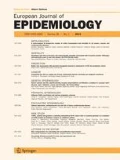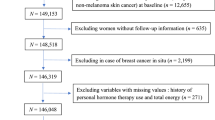Abstract
To evaluate the role of nutritional factors in the etiology of endometrial cancer, we performed a case-cohort analysis using data from women enrolled in the National Breast Screening Study in Canada from 1980 to 1985. For this analysis, a subcohort was constructed by selecting a 10% random sample from the 56,837 women in the dietary cohort. Cases were the 221 women diagnosed with incident adenocarcinoma of the endometrium during follow-up to December 31, 1993 and ascertained by record linkage to the Canadian Cancer Database. Information on usual diet at enrolment and other epidemiological variables was collected by means of self-administered questionnaires. Hazard ratios were obtained from proportional hazards regression models, with estimation of robust standard errors. We found a strong association of endometrial cancer with body mass index >25 kg/m2 (hazard ratio 2.72, 95% CI: 2.06–3.50). Endometrial cancer risk was not associated significantly with intakes of total energy, carbohydrates, proteins, total fat and major fatty acids, total dietary fiber and various types of fibers, vitamin C, E and A, folic acid, β-carotene, lutein, or cryptoxanthin. Some decrease in risk was noted with relatively high intakes of saturated fat, animal fat or lycopene. The associations observed in the study were independent of total energy intake and most non-dietary risk factors. The study suggests that dietary intakes of energy and most major nutrients are not related to the risk of endometrial cancer among Canadian women.
Similar content being viewed by others
References
Hill HA, Austin H. Nutrition and endometrial cancer. Cancer Causes Control 1996; 7: 19–32.
AICR. Food, Nutrition and the Prevention of Cancer: A global perspective. World Cancer Research Fund 903 and the American Institute for Research in Cancer. WI, USA: Banta Book Group, 1997.
Armstrong B, Doll R. Environmental factors and cancer incidence and mortality in different countries, with special reference to dietary practices. Int J Cancer 1975; 15: 617–631.
Kolonel LN, Hankin JH, Lee J, Chu SY, Nomura AMY, Hinds MW. Nutrient intakes in relation to cancer incidence in Hawaii. Br J Cancer 1981; 44: 332–339.
Prentice RL, Sheppard L. Dietary fat and cancer: Consistency of the epidemiologic data, and disease prevention that may follow from a practical reduction in fat consumption. Cancer Causes Control 1990; 1: 81–97.
Villani C, Pucci G, Pietrangeli D, Pace S, Tomao S. Role of diet in endometrial cancer patients. Eur J Gynaecol Oncol 1986; 7: 139–143.
Potischman N, Swanson CA, Brinton LA, et al. Dietary associations in a case-control study of endometrial cancer. Cancer Causes Control 1993; 4: 239–250.
Shu XO, Zheng W, Potischman N, Brinton LA, Hatch MC, Gao Y, Fraumeni JF. A population-based case-control study of dietary factors and endometrial cancer in Shanghai, People's Republic of China. Am J Epidemiol 1993; 13: 155–165.
Levi F, Franceschi S, Negri E, La Vecchia C. Dietary factors and the risk of endometrial cancer. Cancer 1993; 71: 3575–3581.
La Vecchia C, Decarli A, Fasoli M, Gentile A. Nutrition and diet in the etiology of endometrial cancer. Cancer 1986; 57: 1248–1253.
Barboni F, Austin H, Partridge E. Diet and endometrial cancer: A case-control study. Am J Epidemiol 1993; 137: 393–403.
Tzonou A, Lipworth L, Kalandidi A, et al. Dietary factors and the risk of endometrial cancer: A case-control study in Greece. Br J Cancer 1996; 73: 1284–1290.
Goodman MT, Wilken LR, Hankin JH, Lyu L, Wu AH, Kolonel LN. Association of soy and fiber consumption with the risk of endometrial cancer. Am J Epidemiol 1997; 146: 294–306.
Zheng W, Kushi LH, Potter JD, et al. Dietary intake of energy and animal foods and endometrial cancer incidence. Am J Epidemiol 1995; 142: 388–394.
Parazzini F, La Vecchia C, Bocciolone L, Franceschi S. The epidemiology of endometrial cancer. Gynecol Oncol 1991; 41: 1–16.
Schottenfeld D. The epidemiology of endometrial neoplasia. J Cell Biochem Suppl 1995; 23: 151–159.
Grady D, Gebretsadik T, Kerlikowske K, Ernster V, Petitti D. Hormone replacement therapy and endometrial cancer: A meta-analysis. Obstet Gynecol 1995; 85: 304–313.
Schoff SM, Newcomb PA. Diabetes, body size, and risk of endometrial cancer. Am J Epidemiol 1998; 148: 234–240.
Prentice R, Thompson D, Clifford C, Gorbach S, Goldin B, Byar D. Dietary fat reduction and plasma estradiol concentration in healthy postmenopausal women. JNCI 1990; 82: 129–134.
Miller AB, Howe GR, Wall C. The national study of breast cancer screening: Protocol for a Canadian randomized controlled trial of screening for breast cancer in women. Clin Invest Med 1981; 4: 227–258.
Miller AB, Baines CJ, To T, Wall C. Canadian National Breast Screening Study. I. Breast cancer detection and death rates among women aged 40 to 49 years. II. Breast cancer detection and death rates among women aged 50 to 59 years. CMAJ 1992; 147: 14591488.
Jain M, Harrison L, Howe GR, Miller AB. Evaluation of a self-administered dietary questionnaire for use in a cohort study. Amer J Clin Nutr 1982; 36: 931–935.
Watt BK, Merrill AL. Composition of Foods: Raw, Processed, Prepared. Agricultural Handbook No. 8. US Washington, DC, USA: Department of Agriculture, 1972.
Jain M, Howe GR, Rohan T. Dietary assessment in epidemiology: Comparison of food frequency and a diet history questionnaire with a 7-day food record. Am J Epidemiol 1996; 143: 953–960.
Mangels AR, Holden JM, Beecher GR, Forman MR, Lanza E. The carotenoid content of fruits and vegeta bles: An evaluation of analytical data. J Am Dietet Assoc 1993; 93: 284–296.
Chug-Ahuja JK, Holden JM, Forman MR, Mangels AR, Beecher GR. The development and application of a carotenoid database for fruits, vegetables, and multi-component foods containing fruits and vegetables. J Am Dietet Assoc 1993; 93: 318–323.
Willett WC, Stampfer MJ. Total energy intake: Implications for epidemiologic analyses. Am J Epidemiol 1986; 124: 17–27.
Hu FB, Stampfer MJ, Rimm E, et al. Dietary fat and coronary heart disease: A comparison of approaches adjusting for total energy intake and modeling repeated dietary measurements. Am J Epidemiol 1999; 149: 531–540.
Rohan T, Howe GR, Jain M, Miller AB. Dietary fiber, vitamins A, C, and E, and the risk of breast cancer. Cancer Causes and Control 1993; 4: 29–37.
Freidenreich CM, Howe GR, Miller AB, Jain MG. A cohort stud of alcohol consumption and risk of breast caner. Am J Epidemiol 1993; 137: 512–520.
Key TJ, Pike M. The dose effect relationship between “unopposed” oestrogens, endometrial mitotic rate: Its central role in explaining, predicting endometrial cancer risk. Br J Cancer 1988; 57: 205–212.
Potter JD, Steinmetz K. In: Stewart BW, McGregor D, Kleihues P (eds), Principles of Chemoprevention, Vegetables, Fruit and Phytoestrogens as Preventive Agents, Lyon, France: IARC Sc Publ No. 139, 1996; 61–90.
Kato I, Tominaga S, Terao C. Alcohol consumption and cancers of hormone-related organs in females. Jpn J Clin Oncol 1989; 19: 202–207.
Austin H, Drews C, Partridge EE. A case-control study of endometrial cancer in relation to cigarette smoking, serum estrogen levels, and alcohol use. Am J Obstet Gynecol 1993; 169: 1086–1091.
Swanson CA, Wilbanks GD, Twiggs LB, et al. Moderate alcohol consumption and the risk of endometrial cancer. Epidemiology 1993; 4: 530–536.
Webster LA, Weiss NS. Alcoholic beverage consumption and the risk of endometrial cancer. Int J Epidemiol 1989; 18: 786–791.
Gapstur SM, Potter JD, Sellers TA, Kushi LH, Folsom AR. Alcohol consumption and postmenopausal en-dometrial cancer: Results from the Iowa Women's Health Study. Cancer Cause Control 1993; 4: 323–329.
Cauley JA, Gutai JP, Kuller LH, LeDonne D, Powell JG. The epidemiology of serum sex hormones in postmenopausal women. Am J Epidemiol 1989; 129: 1120–1131.
Reichman ME, Judd JT, Longcope C, et al. Effects of alcohol consumption on plasma and urinary hormone concentrations in premenopasual women. JNCI 1993; 85: 722–727.
Author information
Authors and Affiliations
Rights and permissions
About this article
Cite this article
Jain, M.G., Rohan, T.E., Howe, G.R. et al. A cohort study of nutritional factors and endometrial cancer. Eur J Epidemiol 16, 899–905 (2000). https://doi.org/10.1023/A:1011012621990
Issue Date:
DOI: https://doi.org/10.1023/A:1011012621990




